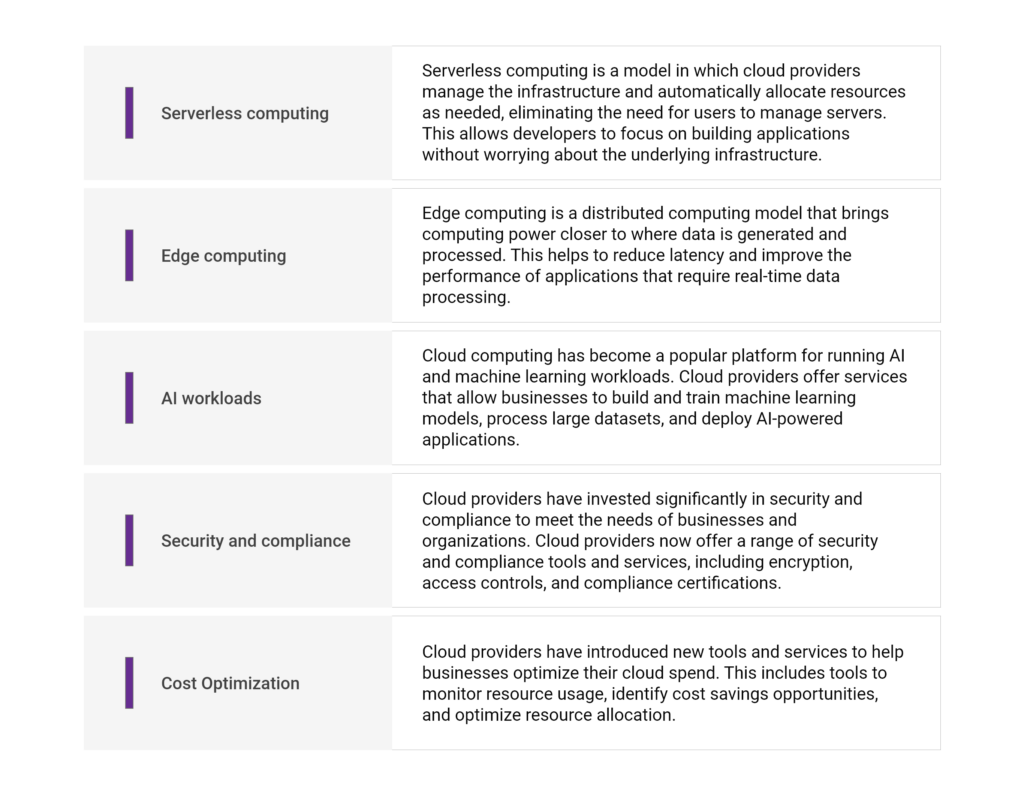Cloud computing is a rapidly evolving technology transforming how businesses and organizations manage their IT infrastructure. In recent years, we’ve seen significant developments in cloud computing that have led to greater flexibility, scalability, and cost savings for users.
Are you keeping up with the latest trends in cloud computing? It can be hard to keep track of all the new features and products being released, but it’s crucial to stay on top of what’s happening in this rapidly evolving industry. In this blog post, we’ll look at the latest buzz around cloud computing, including new features from major providers and exciting innovations to watch out for. Whether you’re a cloud expert or just getting started, there’s something here for everyone. So, let’s dive in!
Trends in Cloud Computing
The advancement of artificial intelligence (AI) and machine learning (ML) has taken great strides in the past few years, with cloud technology leading the change. With cloud computing, AI development is faster, more secure, and more scalable than ever. This has enabled developers to quickly create algorithms that can take on more complex tasks such as natural language processing, computer vision, and analytics.
By leveraging this powerful combination of sophisticated software algorithms and powerful cloud computing capabilities, researchers have made massive advancements in artificial intelligence and machine learning research that were previously impossible – making way for an even brighter future for artificial intelligence and machine learning. Some AI-based industries boosted by cloud advancements include predictive analytics, personalized healthcare, and antivirus models.
The gaming industry is one of the most advanced sectors in leveraging the potential of cloud technology. It has revolutionized how game developers work and how gamers access their favorite video games. For example, streaming services such as Google Stadia and Microsoft Xbox have allowed gamers to instantly access sophisticated games without needing a console or powerful PC. Similarly, cloud-based development platforms are creating a faster rate of innovation for developers, offering them more powerful tools to make innovative and exciting content.
Cloud storage has been an essential factor driving the advancements in gaming technology by allowing gamers to easily save files, characters, and progressions while playing on different devices. Cloud computing is further being used to integrate virtual reality with the gaming industry, poised to unlock great opportunities for gamers soon. Thus, it can be seen that cloud technology has undoubtedly enhanced user experience within the gaming industry.
Multi-cloud solutions represent a powerful advancement in the way businesses manage their data. As the amount of data organizations produce increases, multi-cloud solutions offer an effective, efficient way to store and access this information. Multi-cloud enables companies to store data across multiple cloud provider platforms while affording them flexibility as they scale up or down over time without disrupting their workflow.
It also minimizes costs since businesses don’t have to incur fees with just one provider or manage all their data on-site. Additionally, with these solutions, businesses can obtain strong security capabilities, reassuring customers that their data is reliably protected. There are many advantages for businesses looking for an efficient way to manage their increasing storage requirements, and multi-cloud solutions are proving to be the ideal solution.
Cloud advancements have revolutionized the way businesses and working professionals approach remote working. Not only has it enabled transitioning to remote work with greater ease and speed than ever before, but advances in cloud storage have created greater opportunities for collaboration, communication, and monitoring of project progress while working outside of an office setting.
For example, cloud-based programs like Dropbox and Google Drive make it easy to share documents among distributed teams with version control systems, while video conferencing solutions such as Zoom help teams stay connected so that workers can feel the same sense of community and team spirit found in a traditional workplace. Thanks to these new technologies, those who were once confined by location can now tap into distant opportunities, enabling them to capitalize on their skill sets from anywhere in the world.

As businesses worldwide increasingly rely on cloud computing, the need to utilize modern cloud computing services is becoming increasingly critical. The trends in cloud computing are towards increased use of cloud infrastructure and services. Smaller companies can access enterprise-level resources, and larger companies require greater scalability and speed in an increasingly competitive market. Cloud solutions allow businesses of all sizes to operate with improved efficiency, cost savings, and the ability to quickly deploy updated technology across distributed networks – making it essential for any business hoping to succeed in our digital world.










